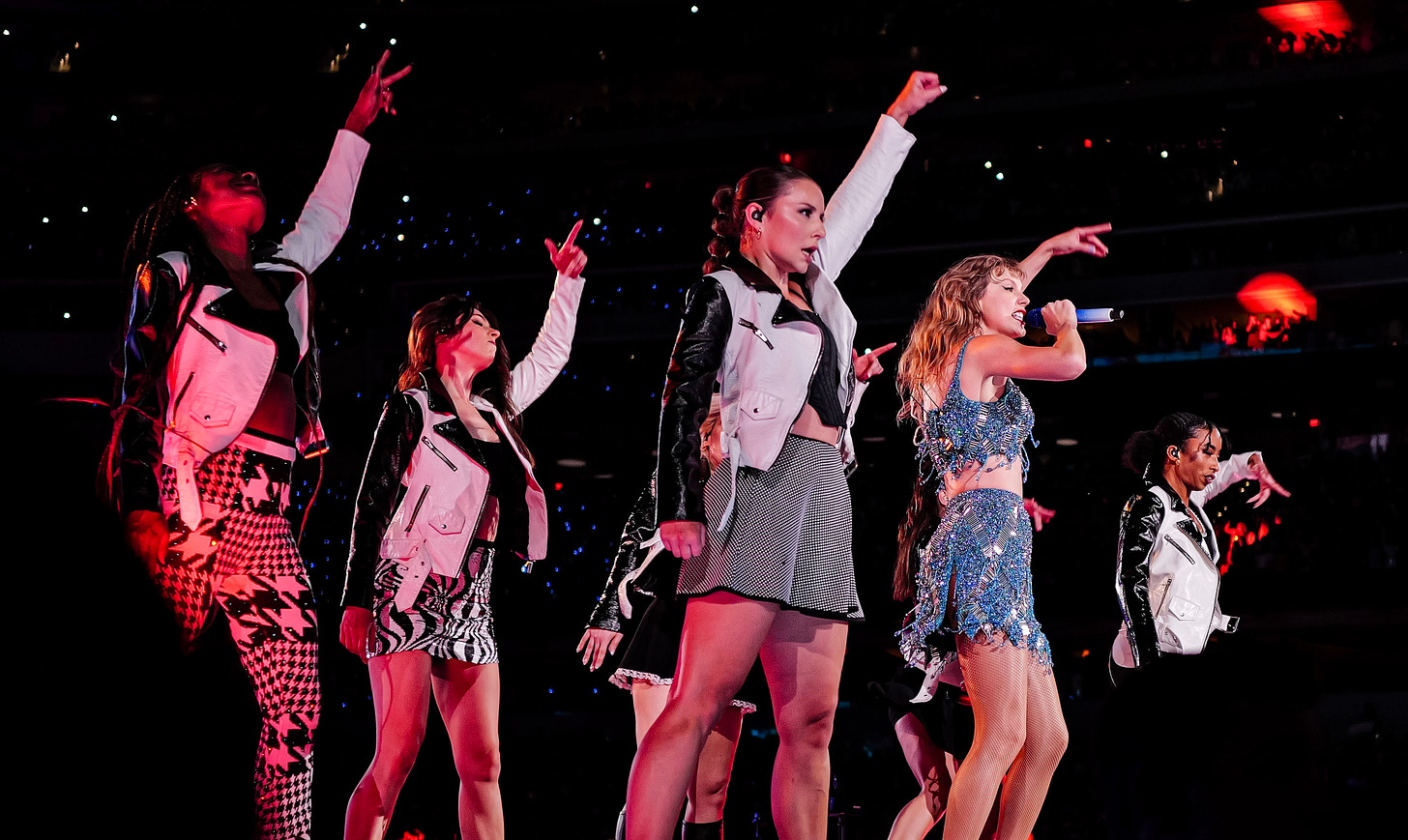
In summer 2023, it seemed that 34-year-old pop superstar Taylor Swift was at the top of her game. According to Forbes, at over $300 million in ticket sales, her Eras Tour had already grossed more than twice the ticket sales of the number two act, Bruce Springsteen. Sales of the Midnights album topped the Billboard sales chart, followed by her re-recorded Speak Now (originally 2010). At the sixth spot was Folklore (2020), a pandemic lockdown album the singer created by swapping files with her team over the internet.
But she got bigger. After the Eras Tour film dropped in October 2023, Forbes Magazine calculated that Swift had joined an exclusive club: she was a billionaire from her music income alone.
Then, there was Swift’s whirlwind fall romance with American football star Travis Kelce and a dramatic trip back from Tokyo to watch him win the Super Bowl. Finally, nominated for six Grammys at the 2024 ceremony, she won two, bringing her up to a record 117 awards. “I would love to tell you that this is the best moment of my life,” Swift said as she accepted her unprecedented fourth Album of the Year award, but she felt so privileged to be a musician that she was happy every minute she worked. “For me,” Swift said, “the award is the work.”
Another aspect of Swift’s work is maintaining an almost magically intimate relationship with her large and growing fan base, which includes 53 percent of American adults. Although concert footage features weeping, singing, be-glittered, young women, 48 percent of Taylor Swift fans are men and boys. About three-quarters are white, and despite her progressive politics, almost half of Taylor Swift fans classify themselves as either Republican or independent.
And fans return the work, not just with their dollars but with their devotion. As happens in spectator sports, people divided over religion and politics unite through the labor of fandom. On a daily basis, they study the object of their devotion as one would a crush, strategizing how to get closer. One 8-year-old girl sold lemonade and the homemade friendship bracelets that fans trade to buy her Eras ticket. In November 2022, thousands of fans rearranged shifts and took sick days to acquire Eras tickets online. The Ticketmaster system then crashed, shutting many out and causing some to sue the company. The anger was so widespread that it triggered Senate Judiciary Committee hearings. There, right-wing Senator Mike Lee (R-UT) acknowledged the GOP’s recent failure to win back the Senate by nodding to Amy Klobuchar (D-MN) and dolefully quoting Swift’s “You Belong with Me”: “She’s cheer captain, and I’m on the bleachers.”
Few Swift communities work harder at their fandom than Gaylors, an internet-based LGBT fan community dedicated to revealing secret messages about Swift’s sexuality in her social media and lyrics. Swift herself is partly responsible for this. She embeds “Easter eggs”—secret messages for her fans—in her liner notes, outfits, social media posts, and songs. Searching for these messages is a form of Taylor Swift scholarship and has become more than a hobby: as happened with Lin-Manuel Miranda’s musical Hamilton, Swift’s oeuvre has moved into the college curriculum.
But as a movement, Gaylor began as most modern obsessions do: on the internet, specifically lesbian internet forums, in 2008. Fantasy seemed to become reality when an intimate friendship sparked between Swift and supermodel Karlie Kloss. An Instagram post on Kloss’s account in March 2014 shows “Karlie ❤️ Taylor” written in the sand. Kloss reaffirmed the message in the comments. The two women were constantly in each other’s company, vacationed together, and Kloss had her own room in Swift’s New York loft. At the time, both were also publicly dating men; Kloss became involved with Jared Kushner’s brother, Joshua, marrying him in 2018. (Taylor did not attend the wedding. You decide.)
Despite all this drama, Gaylors were more or less a world unto themselves until January 4, 2024, when New York Times Opinion editor Anna Marks mainstreamed them in a 5,000-word essay. Swift, Marks argued, is not the proud, independent woman in charge of her career and sexuality that she appears to be, but a queer woman condemned to a glass closet by a homophobic music industry. Marks revealed no new evidence about Swift’s private life (and in fact, perhaps for legal reasons, concealed the actual romance with Kelce and speculative one with Kloss). Instead, she did a Gaylor reading of Taylor Swift’s artistic output and political commitments.
The article sparked a storm of outrage. An anonymous spokesperson from the Swift camp denounced the story as “invasive, untrue, and inappropriate,” something that never would have been written about a man. (In fact, Marks wrote a similar op-ed about singer Harry Styles, who Swift briefly dated in 2022.) Lesbian country singer Chely Wright condemned the piece as “triggering,” not just because it cited her own emotional struggles in the industry, but also because “seeing a public person’s sexuality being discussed is upsetting.”
Yet regardless of Swift’s private history and the entertainment industry’s long-standing homophobia, both Marks and her critics have missed two crucial facts.
It is the queerness of fandom, not the artist, that helps us understand Swift better. By obsessively consuming information available to all and rearranging it into new stories, fans grow ever closer to a beloved who can never really be known.
At the same time, it is the paradoxical queerness of Swift’s original genre, country music, that allows the artist to create a safe space for LGBT fans.
Sadly, the full post—and links to other Taylor Swift essays commissioned for a series at Public Seminar—is for paying subscribers. Can you:
Keep reading with a 7-day free trial
Subscribe to Political Junkie to keep reading this post and get 7 days of free access to the full post archives.



